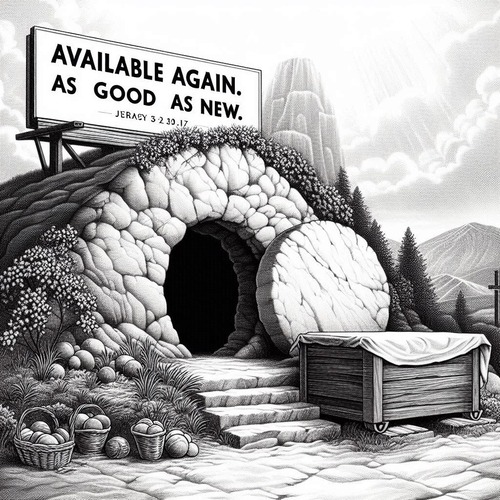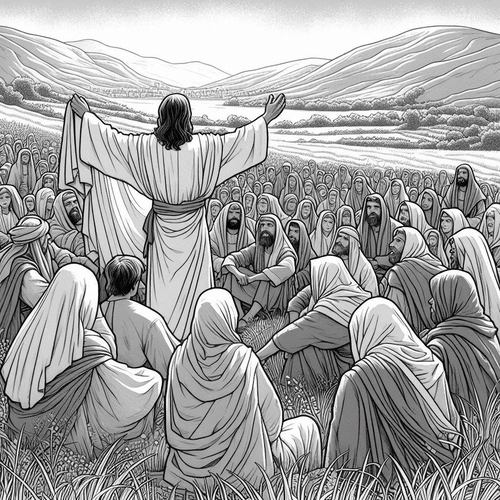The Trinity Mystery: Why Jesus Addresses the Father as God?
Every thoughtful Christian encounters this puzzle eventually. If Jesus is truly God—as orthodox Christianity has always confessed—why does He consistently address the Father as “God”? Why does He pray to the Father? Why does He say things like “My God, my God, why have you forsaken me?” on the cross, or tell Mary Magdalene after His resurrection, “I am ascending to my Father and your Father, to my God and your God”?
This isn’t a gotcha question designed to trip up believers. It’s a legitimate theological concern that deserves a careful, biblical answer…
THE FOUNDATION: ONE GOD, THREE PERSONS
The key to understanding this apparent paradox lies in grasping what Christians mean by the Trinity. We don’t believe in three gods who somehow cooperate. We believe in one God who exists eternally as three distinct persons: Father, Son, and Holy Spirit. This isn’t modalism—the heretical idea that God simply wears three different masks or plays three different roles. The Father is eternally Father, the Son is eternally Son, and the Holy Spirit is eternally Spirit.
This distinction matters enormously. When Jesus addresses the Father as God, He’s not denying His own deity. He’s functioning as the eternal Son in relationship to the eternal Father. Even within the one divine essence, there are real, eternal relationships between the persons of the Trinity.
WHY JESUS ADDRESSES THE FATHER AS GOD: THE INCARNATION CHANGES EVERYTHING
The incarnation—God becoming man—adds crucial context to Jesus’ prayers and statements. When the eternal Son took on human nature, He didn’t cease to be God, but He did take on everything that makes us human (except sin). The Westminster Confession puts it clearly: Jesus is “very God and very man, yet one Christ.”
As a man, Jesus naturally addresses the Father in prayer. His human nature requires communion with God just as ours does. When we see Jesus praying, we’re witnessing the perfect human response to the Father—something Adam failed to provide, but the Second Adam fulfils completely.
This isn’t Jesus merely “pretending” to be human while secretly operating as God behind the scenes. In His incarnate state, Jesus voluntarily submitted to the Father as part of His redemptive mission. Philippians 2:5-8 describes this beautifully: Christ, “being in the form of God, did not count equality with God a thing to be grasped, but emptied himself, by taking the form of a servant, being born in the likeness of men.”
BIBLICAL EVIDENCE FOR UNITY AND DISTINCTION
Scripture consistently presents both Christ’s deity and His distinct relationship with the Father. John 1:1 provides the perfect example: “In the beginning was the Word, and the Word was with God, and the Word was God.” Notice the careful language—the Word (Jesus) was both “with God” (showing distinction) and “was God” (showing unity of essence).
In John 17, Jesus prays to the Father as our great high priest and mediator. But this doesn’t diminish His deity any more than a human ambassador’s representing his country diminishes his citizenship. Jesus mediates between God and humanity precisely because He is both fully God and fully man.
Perhaps most remarkably, Hebrews 1:8-9 shows the Father addressing the Son as “God” while also referring to “your God.” The Father declares: “But of the Son he says, ‘Your throne, O God, is forever and ever… therefore God, your God, has anointed you with the oil of gladness beyond your companions.'” Here we see the Father acknowledging both the Son’s deity and His distinct personal relationship within the Trinity.
ADDED CLARITY: ETERNAL GENERATION AND COVENANT
Reformed theology provides crucial insights that resolve this tension. The doctrine of eternal generation teaches that the Son is eternally “begotten” of the Father—not created or made, but eternally proceeding from the Father’s essence. This means the Son is fully God while eternally existing in a Father-Son relationship.
The Reformed tradition also speaks of the covenant of redemption (pactum salutis)—an eternal agreement between Father and Son for the salvation of the elect. In this covenant, each person of the Trinity takes on distinct roles in the work of redemption. The Father sends, the Son redeems, and the Spirit applies salvation. These roles don’t create inequality of essence but demonstrate the beautiful order within the Trinity.
The Westminster Confession captures this perfectly: “The Father is of none, neither begotten nor proceeding; the Son is eternally begotten of the Father; the Holy Ghost eternally proceeding from the Father and the Son.” This language preserves both the unity of the divine essence and the distinctness of the persons.
ADDRESSING COMMON OBJECTIONS
- “But this sounds like you’re describing two gods!” Not at all. We’re describing one God who exists as three persons.
- “Jesus seems to be treating the Father as superior.” In terms of role and function during the incarnation, yes. But functional subordination doesn’t equal ontological inequality. A CEO and a vice president might have different roles in a company while being equally human. Similarly, the Son’s submission to the Father in the economy of salvation doesn’t make Him less divine.
- “Why complicate things with all this theological language?” Because Scripture itself reveals these complexities. We don’t invent the Trinity to make theology more difficult; we discover it because the Bible teaches that God is one (Deuteronomy 6:4) while also revealing the Father as God, Jesus as God, and the Holy Spirit as God.
WHY JESUS ADDRESSES THE FATHER AS GOD: THE BEAUTIFUL TRUTH
Rather than creating a problem, Jesus’ addressing the Father as God actually enhances our understanding of His deity. It shows us the Trinity isn’t an abstract doctrine but a living reality of divine relationships. When Jesus prays to the Father, He’s not denying His divinity but expressing it in the perfect fellowship that has existed eternally between Father and Son.
This also provides immense comfort for believers. Jesus’ prayers as our high priest show His perfect humanity serving our redemption. Because He is both fully God and fully man, He can represent us before the Father while also being the God to whom we pray.
The mystery of the Trinity isn’t a problem to be solved but a truth to be worshiped. We may not fully comprehend how God can be one essence in three persons, but we can rest in the clarity Scripture provides. Jesus addresses the Father as God not because He isn’t God, but because He is the eternal Son, perfectly fulfilling His role in our redemption while never ceasing to be fully and eternally divine.
WHY JESUS ADDRESSES THE FATHER AS GOD: RELATED FAQs
Did the early church fathers struggle with this question too? Absolutely. The Cappadocian Fathers (particularly Basil the Great and Gregory of Nazianzus) developed much of our Trinitarian language specifically to address this issue. They distinguished between ousia (essence) and hypostasis (person), showing how the Son could be homoousios (same essence) with the Father while maintaining distinct personal properties. Augustine later built on this foundation, arguing Jesus’ prayers demonstrate His role as mediator, not inferiority of nature.
- How do Reformed scholars explain Jesus saying “The Father is greater than I” (John 14:28)? John Calvin interpreted this as referring to Christ’s incarnate state and mediatorial office, not His essential deity. Charles Hodge argued that “greater” refers to the Father’s position as the sender versus the Son as the sent one—a functional distinction, not an ontological one. Contemporary Reformed scholar Robert Letham explains this as the Son’s voluntary assumption of a subordinate role in the economy of salvation while remaining equal in the immanent Trinity.
- What about Jesus’ statement “Why do you call me good? No one is good except God alone” (Mark 10:18)? Reformed theologians like John Owen and more recently Michael Horton argue Jesus isn’t denying His goodness or deity, but rather challenging the rich young ruler to consider the implications of his words. If Jesus is truly good, He must be God, since only God is good. This is actually a subtle revelation of His deity, not a denial of it. Calvin saw this as Jesus drawing out the man’s understanding of who he was really addressing.
Does the Son’s eternal generation mean He’s somehow “less eternal” than the Father? No—this is a crucial Reformed distinction. Eternal generation means the Son is begotten “from all eternity,” not at a point in time. As the Westminster Confession states, there was never a time when the Son wasn’t the Son. Reformed scholars like Louis Berkhof and Herman Bavinck emphasised eternal generation describes the Son’s personal property and relationship to the Father, not His coming into existence. The Son is as eternal as the Father, just eternally begotten.
- How do we handle Jesus’ cry of dereliction: “My God, my God, why have you forsaken me?” Calvin argued Jesus experienced genuine spiritual agony as He bore our sins, while the divine nature remained united to the human nature. John Owen developed this further, explaining that the Son’s divine person experienced the wrath due to sin through His human nature. Contemporary Reformed scholar Robert Peterson notes Jesus quotes Psalm 22:1, which ends in triumph—suggesting that even in dereliction, Jesus trusted the Father’s ultimate plan.
- What’s the difference between Jesus’ prayers and our prayers if He’s God? Reformed theology distinguishes between Christ’s prayers as our mediator and our prayers as dependent creatures. Herman Witsius explained that Jesus prayed both as the God-man fulfilling His mediatorial role and as truly human, needing communion with the Father. Unlike our prayers, which are offered through Christ, Jesus’ prayers are offered by Christ as our representative. John Murray emphasised Jesus’ prayers were part of His active obedience, perfectly fulfilling what Adam failed to do.
Why don’t we see Jesus praying to the Holy Spirit in Scripture? This reflects the economic order of the Trinity in redemption. Sinclair Ferguson explains the Spirit’s role is to point to Christ and apply His work, not to receive worship or prayer in the economy of salvation. BB Warfield noted that while the Spirit is equally God, the redemptive order shows the Father sending the Son, the Son accomplishing salvation, and the Spirit applying it. This doesn’t diminish the Spirit’s deity but reflects the beautiful order within the Trinity’s redemptive work.
WHY JESUS ADDRESSES THE FATHER AS GOD: OUR RELATED POSTS
Editor's Pick

GPS Without Eyes: How Ants Silently Shout Intelligent Design
Picture a leafcutter ant navigating the rainforest floor in pitch darkness, carrying a leaf fragment 50 times its body weight. [...]

Born Broken: Why Must We Affirm Original Sin?
Imagine a world where we’re born neutral—free to choose good, and without a bias toward evil. Sounds appealing… until we [...]

Does God Truly Care About My Everyday Choices?
OWe believe God created the universe. We believe He orchestrated the exodus from Egypt and raised Jesus from the dead. [...]
SUPPORT US:
Feel the Holy Spirit's gentle nudge to partner with us?
Donate Online:
Account Name: TRUTHS TO DIE FOR FOUNDATION
Account Number: 10243565459
Bank IFSC: IDFB0043391
Bank Name: IDFC FIRST BANK






